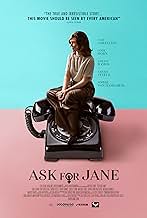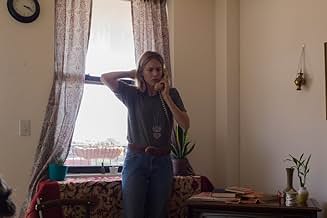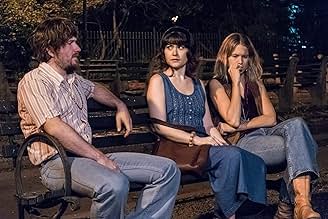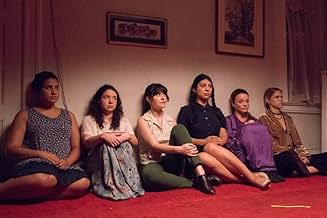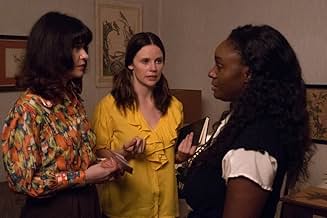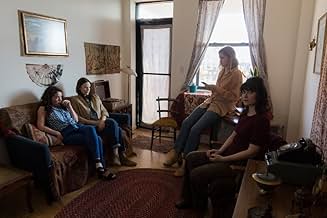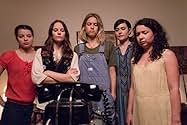Adicionar um enredo no seu idiomaA group of determined Midwestern women begin providing safe but illegal abortions in this 1960s period drama based on a true story.A group of determined Midwestern women begin providing safe but illegal abortions in this 1960s period drama based on a true story.A group of determined Midwestern women begin providing safe but illegal abortions in this 1960s period drama based on a true story.
- Prêmios
- 4 vitórias no total
- Direção
- Roteiristas
- Elenco e equipe completos
- Produção, bilheteria e muito mais no IMDbPro
Avaliações em destaque
I was very engrossed in watching Ask for Jane. Though I am of the same generation, aware and well read, I didn't know about the Janes. I wonder whether publicity about them ever reached the East Coast. I had to keep reminding myself that the film took place in the Midwest, thereby making the plight of women more of a struggle than in more progressive cities on both Coasts. Their location also explained the way the women looked, which puts a positive spin on it, rather than saying the director screwed up. Some of the outfits they wore and hair styles were not very realistic. In fact, one was downright distracting: one of the main characters, Rose, had a dye job, in which the bottom three inches or her hair were reddish while the rest was dark brown. To my knowledge this type of hombre effect in hair coloring did not become a popular style until after the Millennium.
But hair and clothes aside, the film is powerful in its portrayal of dedicated young women who felt strongly enough about helping women, including themselves, to risk being arrested and convicted of a crime. Ultimately the film is about the oppression of women, and how the right to control one's own body, and even to know and understand one's body, had always been in the hands of men.
The film was strong in showing how in most situations, the women were always expected to defer to men, whether their husbands, fathers, doctors or clergy. Despite coming from relatively conservative backgrounds, the women portrayed, the Janes as they were known, were brave, noble and revolutionary. I hope they got (or get) at least some of the recognition they deserved.
But hair and clothes aside, the film is powerful in its portrayal of dedicated young women who felt strongly enough about helping women, including themselves, to risk being arrested and convicted of a crime. Ultimately the film is about the oppression of women, and how the right to control one's own body, and even to know and understand one's body, had always been in the hands of men.
The film was strong in showing how in most situations, the women were always expected to defer to men, whether their husbands, fathers, doctors or clergy. Despite coming from relatively conservative backgrounds, the women portrayed, the Janes as they were known, were brave, noble and revolutionary. I hope they got (or get) at least some of the recognition they deserved.
A story that must be told and addressed always. Shows how this crap still has to be fought. Bible thumpers don't know how to mind their business and keep their religion and politics to theirselves amongst their own believers. Church and state still.mingle on daily. Just stuck living in the past forever in make believe Bible land. This is a medical procedure that lies in the hands and choice of the women who CHOOSE this for themselves and their well being. It is Not the business of the holier than thou hypocrite sinners who complain at every turn and provide zero support to those they want to force into their ways. Not to mention do the same exact stuff in the dark undercover. Ok sorry im a little touchy about this subject.
A different movie and was really worth watching. I liked sets and designs.
It's a shame that the issue of abortion is still one that plagues the political dialogue. With the recent law passed in Alabama, we are one step closer to the nightmarish implications women faced in pre-Roe v. Wade America, where obtaining an abortion was difficult, painful, and often impossible. The Jane Collective, the basis for "Ask for Jane", was one of the groups who defied the laws, helping women obtain safe abortions and providing a support network. Unfortunately, the brave efforts of these women has not received the film adaptation they deserved in "Ask for Jane".
For starters, the main thing holding this film back is it's budget. According to what I can find online, the film had a budget of $250,000. Even when considering that shoestring budget, this film is incredibly lacking. Films like "Thunder Road" (with a budget of $200,000) and "Upstream Color" ($50,000) look leagues better than "Ask for Jane". Perhaps that is because, unlike those other films (or most low-budget films, for that matter), "Ask for Jane" is a period film, set in the late 60s/early 70s in Chicago. In my initial viewing, I wasn't aware of the exact budget, but began to notice that 90% of the scenes were shot indoors, and the framing of the few outdoor scenes was very tight and claustrophobic. I soon realized that this is because if the shots were any wider, we'd catch the modern stores and cars they were walking past. I will give the filmmakers credit that I wasn't able to catch any Starbucks or SUVs in the background. However, with limited resources, a film should be able to trick it's viewers into not seeing it's shortcomings. This film fails in that respect, with the cheap synthetic costumes, hastily decorated starter apartments, and all cars or other expensive spectacle occurring offscreen (save for one powder-blue Oldsmobile the film was able to secure).
Even if the budget was sufficient for this film, there were still other issues to overcome. A rushed feel, a lack of coverage, and a script that has characters randomly being introduced and dropped until almost the very end of the 108-minute film kill the pacing of the project.
The tone of the film is also over the place. Abortion is probably one of the most difficult subjects to tackle in storytelling, and "Ask for Jane" can't decide what tone it wants to take. In some scenes, abortion is treated with solemn urgency. In others, it's treated with blase flippancy ("My parents are really religious", one pregnant character cries. "So just get an abortion", says her roommate, with the significance of telling her to run to the supermarket to get milk.) In one very strange moment in a montage, abortion is played for comedy, when a frazzled mother of four chokes out "I CAN'T have another."
For the most part, the performances were fine. The main seven women portrayed their roles with conviction, and the peripheral characters fulfilled their purposes. The only weak link was main character Rose's fiance, who woodenly leaves her after her involvement in The Jane Collective would potentially ruin his chances of running for "office" (what office or political platform he takes, the movie doesn't seem to really care about). His main problem is that he doesn't seem convincingly upset about Rose's part-time job as an abortionist, so his decision to leave her doesn't make any sense.
The biggest shame of "Ask for Jane" is that I wish a better film would be made about The Jane Collective. This group helped thousands of women reclaim their lives and their bodily autonomy. However, the filmmakers seem to be mistaken that historical importance is a substitute for competent production design, nuanced direction, or defined characters.
For starters, the main thing holding this film back is it's budget. According to what I can find online, the film had a budget of $250,000. Even when considering that shoestring budget, this film is incredibly lacking. Films like "Thunder Road" (with a budget of $200,000) and "Upstream Color" ($50,000) look leagues better than "Ask for Jane". Perhaps that is because, unlike those other films (or most low-budget films, for that matter), "Ask for Jane" is a period film, set in the late 60s/early 70s in Chicago. In my initial viewing, I wasn't aware of the exact budget, but began to notice that 90% of the scenes were shot indoors, and the framing of the few outdoor scenes was very tight and claustrophobic. I soon realized that this is because if the shots were any wider, we'd catch the modern stores and cars they were walking past. I will give the filmmakers credit that I wasn't able to catch any Starbucks or SUVs in the background. However, with limited resources, a film should be able to trick it's viewers into not seeing it's shortcomings. This film fails in that respect, with the cheap synthetic costumes, hastily decorated starter apartments, and all cars or other expensive spectacle occurring offscreen (save for one powder-blue Oldsmobile the film was able to secure).
Even if the budget was sufficient for this film, there were still other issues to overcome. A rushed feel, a lack of coverage, and a script that has characters randomly being introduced and dropped until almost the very end of the 108-minute film kill the pacing of the project.
The tone of the film is also over the place. Abortion is probably one of the most difficult subjects to tackle in storytelling, and "Ask for Jane" can't decide what tone it wants to take. In some scenes, abortion is treated with solemn urgency. In others, it's treated with blase flippancy ("My parents are really religious", one pregnant character cries. "So just get an abortion", says her roommate, with the significance of telling her to run to the supermarket to get milk.) In one very strange moment in a montage, abortion is played for comedy, when a frazzled mother of four chokes out "I CAN'T have another."
For the most part, the performances were fine. The main seven women portrayed their roles with conviction, and the peripheral characters fulfilled their purposes. The only weak link was main character Rose's fiance, who woodenly leaves her after her involvement in The Jane Collective would potentially ruin his chances of running for "office" (what office or political platform he takes, the movie doesn't seem to really care about). His main problem is that he doesn't seem convincingly upset about Rose's part-time job as an abortionist, so his decision to leave her doesn't make any sense.
The biggest shame of "Ask for Jane" is that I wish a better film would be made about The Jane Collective. This group helped thousands of women reclaim their lives and their bodily autonomy. However, the filmmakers seem to be mistaken that historical importance is a substitute for competent production design, nuanced direction, or defined characters.
Greetings again from the darkness. Sometimes the message of a movie is so much more important than the production quality that we can look past the 'how' that would normally make watching a chore, and instead focus on the 'what' and the 'why' to find enlightenment. Writer-director Rachel Carey's first feature film, co-written with Cait Cortelyou, tells the fascinating story of The Jane Collective ... also known as 'The Janes' and 'The Abortion 7'. It's yet another true life story that finds us asking ourselves, "How have I never heard of this before?"
The film opens in 1972 when abortion was still illegal. The camera focuses on women in a jail cell ... women that seem quite out of place behind bars. We then flashback 4 years to a dorm room in Chicago, and female students are discussing the predicament of one of their friends. This leads to the development and early stages of the Jane Collective, a secret organization to assist women in obtaining counseling and abortion. This was a time when not only was abortion illegal, but doctors would often speak directly to a husband about medical options for their wife, leaving the women with little information and no power to make their own decisions. The film touches on just how desperate women were. Rat poison, self-punches to the gut, razor blades, knitting needles, and even jumping off roofs were all used as 'solutions' to a situation for which they were only half responsible.
Now depending on your views, you may find abortion unacceptable. This underground abortion network assisted 11,000 women between 1968 and 1973, when Roe vs. Wade legalized the procedure. This landmark legal decision put an end to the Janes, as well as the back alley con artists and dangerous methods women previously used. Co-writer Cait Cortelyou stars as Rose, a character based on the real life Heather Booth, a hero to many. Supporting roles are covered by Cody Horn, Chloe Levine, Sarah Steele, Ben Rappaport, Sophie von Hasleberg, Alison Wright, Danny Flaherty, and Michael Rabe (son of the late Oscar winning actress Jill Clayburgh). Judith Arcana, a real life Jane, has a cameo and was a consulting producer on the film.
With a budget of only $250,000 raised (fittingly) through grass roots donations, the film is not a slick Hollywood production; however, these are women from recent history who deserve to be recognized and remembered for their courage and commitment. Women were forced to look out for each other, and these women certainly stepped up. With the recent legal attention being brought back to the topic of abortion, this story is quite timely, despite having taken place 50 years ago. How sad.
The film opens in 1972 when abortion was still illegal. The camera focuses on women in a jail cell ... women that seem quite out of place behind bars. We then flashback 4 years to a dorm room in Chicago, and female students are discussing the predicament of one of their friends. This leads to the development and early stages of the Jane Collective, a secret organization to assist women in obtaining counseling and abortion. This was a time when not only was abortion illegal, but doctors would often speak directly to a husband about medical options for their wife, leaving the women with little information and no power to make their own decisions. The film touches on just how desperate women were. Rat poison, self-punches to the gut, razor blades, knitting needles, and even jumping off roofs were all used as 'solutions' to a situation for which they were only half responsible.
Now depending on your views, you may find abortion unacceptable. This underground abortion network assisted 11,000 women between 1968 and 1973, when Roe vs. Wade legalized the procedure. This landmark legal decision put an end to the Janes, as well as the back alley con artists and dangerous methods women previously used. Co-writer Cait Cortelyou stars as Rose, a character based on the real life Heather Booth, a hero to many. Supporting roles are covered by Cody Horn, Chloe Levine, Sarah Steele, Ben Rappaport, Sophie von Hasleberg, Alison Wright, Danny Flaherty, and Michael Rabe (son of the late Oscar winning actress Jill Clayburgh). Judith Arcana, a real life Jane, has a cameo and was a consulting producer on the film.
With a budget of only $250,000 raised (fittingly) through grass roots donations, the film is not a slick Hollywood production; however, these are women from recent history who deserve to be recognized and remembered for their courage and commitment. Women were forced to look out for each other, and these women certainly stepped up. With the recent legal attention being brought back to the topic of abortion, this story is quite timely, despite having taken place 50 years ago. How sad.
Principais escolhas
Faça login para avaliar e ver a lista de recomendações personalizadas
- How long is Ask for Jane?Fornecido pela Alexa
Detalhes
- Tempo de duração1 hora 48 minutos
- Cor
Contribua para esta página
Sugerir uma alteração ou adicionar conteúdo ausente

Principal brecha
By what name was Ask for Jane (2018) officially released in India in English?
Responda

